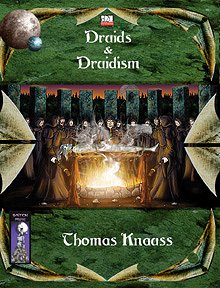
Intended to portray druids as more than nature-loving clerics, this book contains a collection of prestige classes, new feats and spells, and other ideas designed to enhance this character class.
The Introduction sets the scene. Most folk regard the forces of nature as something to be feared and to be overcome: druids embrace them and utilise them instead. However they are not some kind of vegan ecowarrior (at least, most of them are not), surrounded by adoring animals and making use of hallucinogenic drugs. They are interested in living in harmony with nature and are often solitary, although they enjoy the company of animals and other druids. Most do hunt for food, and utilise flora and fauna for many purposes. They do tend to be a bit sanctimonious about respect for nature, though! They seek to maintain balance, hence a neutral alignment.
Six prestige classes are presented in copious detail. These druids are the specialists: in a particular type of animal or in a given terrain, such as the Glacier Walker who embraces the chillier parts of the world, many of whom produce magificent ice sculptures which can serve many purposes. Warnings to visiting hunters and trappers to respect the land. Messages to other druids about what is there. Boundary markers to their territories. At the other extreme, a Guardian of the Oasis is a desert-dweller. Although they usually have access to fresh water, they are often regarded with suspicion as they get along with snakes and scorpions. There also are Highlanders (who tend to be ferocious), Lords of the Flies (who get along with insects and even base their social structures on them), and Packleaders (who travel with packs of wolves rather than settling in one place). Likewise a Pride Master associates with lions. A Scourge of the Dead is particularly ferocious in pursuit of the undead (although no druid cares for them much), and finally the Waverider is concerned about the aquatic environment - usually rivers, ponds and lakes although some prefer the sea.
Next comes a collection of useful feats aimed at druids, although most may be taken by any character who meets the prerequisites. This is followed by a collection of Nature's Handiworks which starts with discussions of wood and leather as resources with which druids can work... mostly, apparently, to make armour! However the use of homeopathic remidies is covered (would-be herbalists are directed to Alchemy and Herbalism, another Bastion Press sourcebook), and there are various compounds to make. Most sound suspiciously like herbalism to me. As well as healing compounds, there's also a section on natural poisons and how to harness them; including a rather dramatic account of how to harvest venom from snakes. Harvesting plant-based poisons sounds a lot safer.
Then comes Nature's Magic, a collection of new spells for druids and also rangers. These are followed by new magic items, mostly armour and weapons although there are also some rings and staves; and some wondrous items as well.
The next section covers the main druidic organisation, the Circle. Although they shun conventional civilisation and tend to the nomadic, they still socialise with one another, and work together against any threats. There was some mention of Circles in the discussion of prestige classes, but here they are gone into in much more detail. The Circle is both a group and the physical space in which the members meet, so there are details of how Circles are constructed in every type of terrain. Once built, rituals must be undetaken to consecrate the new Circle before it can be used. This is quite long and involved. The various forms of organisation and activities a Circule of Druids may engage in is also discussed. Gaining membership can be arduous and even life-threatening... unless the candidate is the child of two existing Circle members. They are accepted automatically.
Finally, Nature's Bond deals with companions, the druidic equivalent of a familiar. They exemplify the bond between the druid and nature itself, and provide company and friendship for the druid. There's also a rather sad note about what happens when a druid becomes disillusioned or decides to head for the comforts of more 'civilised' life... and how they can restore their place within nature if they change their mind.
Much of this material will be of more use for NPC druids, or as background knowledge for a druid player character, rather than something that can be used in play. However, there is scope for constructing adventures around many aspects discussed in this book, with druids as allies or enemies, depending on the party and what the druids might be doing. Plenty here worth a look.
Return to Druids and Druidism page.
Reviewed: 11 November 2019

